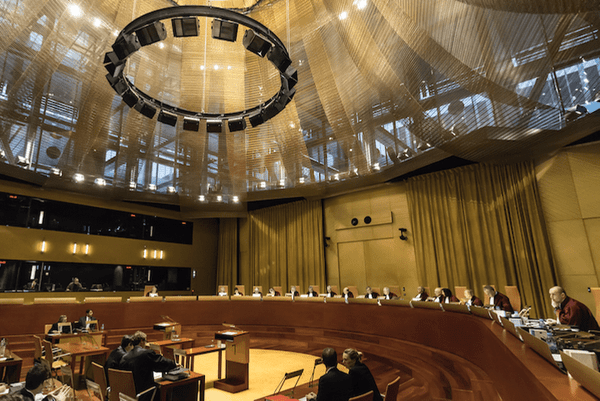
Foreign funding restrictions and anti money laundering: latest developments
August 5, 2020
It’s back to school for the European institutions
September 9, 2020As cost-cutting measures and redundancy announcements sweep across the corporate world, what does this mean for the future of corporate fundraising? Fundraising Europe explores what charities can do to build and sustain corporate partnerships.
There’s no doubt that this is a challenging environment for charities to generate income across the board, but recent studies suggest that it’s corporate fundraising that will be hit particularly hard in the coming years.
Businesses large and small are feeling the pinch after many months of reduced trading levels due to the Covid-19 pandemic. Cost-cutting measures are being introduced and large-scale redundancy announcements are increasingly widespread, making it more difficult for employers to justify giving money away while simultaneously shedding staff.
While some national economies have been more severely impacted than others, many employees across Europe are still working from home and there remains continued uncertainty about the spread of the virus and what this means for future working practices. Against this backdrop, what does this mean for corporate fundraising?
Pandemic expected to take its toll
Recent surveys of fundraising specialists in the Netherlands, the UK and the US found that, out of a broad range of voluntary income streams, corporate giving was the area most likely to decline over the next three to five years, while major giving and legacies were expected to drive income growth.
Thomas Schiffelmann, head of marketing at Handicap International in Germany, says: “The Covid pandemic is having a huge impact on our corporate partners. Companies have less income, so we’re facing an even bigger challenge to raise funds.”
With responsibility for strategic and value-based corporate partnerships at Save the Children (Redd Barna) in Norway, Bodil Sveen Berggren agreed, saying corporate fundraising, prospecting and managing existing partnerships have all become more challenging.
She commented: “This spring, the pandemic instantly resulted in corporates reducing costs, preparing for economic uncertainty. Supporting organisations like ours, while at the same time laying off employees, is not easily communicated.
“Preventing a learning crisis from becoming a generational catastrophe requires urgent action from all. Building knowledge helps the corporate community stay attentive to the macro picture. Hence, we share information about how we work to reduce the negative effects Covid-19 has on children and communities around the world. Despite being in the middle of a deep economic downturn, we see signs of renewed interest from the B2B segment.”
While Reinier Spruit, interim fundraising manager & senior advisor at Greenpeace in the Netherlands, believes that income projections for corporate fundraising are heavily linked to the corona crisis, he also feels that corporate donations can often be overrated in the fundraising mix. He says: “The expectations from charities starting out in this area – in both how fast and how much income can be raised from corporates – are almost always too high.”
Working towards a diverse funding base will be all the more important for ensuring resilience in the years ahead. While income from corporate fundraising may well decline, some charities and NGOs have strengthened corporate relationships in recent months. The pandemic environment is also seen to have created new opportunities for relationship building for those taking a more strategic and innovative partnership approach.
Accelerating change
Many successful nonprofits in the field adjusted their corporate fundraising strategy to demonstrate their relevance in the Covid world, seeking out new potential funders with a strong fit.
In Eastern Europe, SOS Children’s Villages International was one such organisation, gaining new partners during the pandemic. Private partnerships advisor for the CEE / CIS / ME regions, Katalin Kovácsné Béres attributes this to companies’ willingness to take action to alleviate the crisis in their nearby communities, and to their own shift of approach. She emphasised the need for nonprofits to be authentic and agile in their approach to partnerships in the current environment, adding: “It’s important that needs are identified properly on both the companies’ and their own side, and that those needs are put into context at a community level, exploring how they will contribute to solving issues and creating impact.”
She explained that the key was in demonstrating empathy and willingness to care towards businesses that they work with, saying: “We waited to see which sectors were impacted positively and negatively by the crisis and then acted accordingly. This meant being supportive towards those partners whose industries had been heavily impacted by the pandemic by, for example, simply asking “how are you?” or even offering psychological support from our experts to company employees in their home office. It also meant identifying those partners that might be able to deliver additional support like extra resources for increased needs due to the pandemic. We clearly defined our Covid-related activities, identifying our role in alleviating the crisis and the precise needs related to that.”
Similarly, the Youth Academy (Nuorten Akatemia) in Finland cites how important adaptability has been to the organisation’s partnership strategy, highlighting that long-term partnerships are key. When social distancing restrictions restricted their ability to deliver services to their corporate clients, they developed new digital tools, including pedagogical games, to be used as a part of the organisation’s youth participation services and online learning platform. These services are not only beneficial for young people, but form a core part of the organisation’s unique corporate partnership model.
Seeking true partnerships above corporate donations
Fundraisers emphasise that a successful partnership is about so much more than income alone, with all parties bringing something to the table and gaining from it.
Katerina Eskelinen, international agency coordinator of Youth Academy, adds: “Ultimately, when we build a partnership, we believe that all parties should be able to profit from it. Young people get opportunities to learn and experience new things and be part of society, our partners learn more about young people and can develop their services or products in a way that is targeted to that group, and we get the opportunity of using and growing our expertise. So we don’t see the corporate partnership strictly as a charitable activity, but we see it as providing high quality services to our partners.”
Berggren agrees with the importance of mutual benefit and a willingness to adapt, saying: “These are changing times, and we need dialogue and collaboration with others to find the best solutions, adapting our products and services to meet market demand. What’s more, we should utilise the capacity the corporate community has to innovate and scale and use corporates as a channel to advocate for positive, sustainable change.
“The value of strong, long term, strategic corporate partnerships is clearer than ever. Utilising corporates’ capacity and competency, distribution network, technological knowhow and digitalisation, will lay the foundations for mutually beneficial partnerships.”

CASE STUDY: Youth Academy
Youth Academy is a Finnish youth work organisation working to build bridges between those aged 13-25 and wider society, supporting young people’s projects, ambitions, learning and participation. The organisation delivers workshops for young people on topics ranging from tax to insurance, climate change, sexual health and sustainable mobility. It also provides training for adults that work with young people.
While the organisation is mostly financed by public funds, the Youth Academy sought to generate funding from the corporate sector by setting up a trading arm to sell what the charity excels at: its in-depth understanding of young people.
Katerina Eskelinen, international agency coordinator of Youth Academy says:
“The business world wants to hear more from young people, so we offer corporations a way to connect with them and understand their views. This might include their views of the company as an employer, its services and even developing new ideas about what the company should do. To achieve these goals, we develop tools for companies to hear what young people have to say including gaming strategies such as method card decks, mobile games and story-based escape games, as well as more traditional focus groups and workshops.”
“To have a sustainable economic model, we don’t ask for donations. We simply sell our own services; the thing that we are best at – and with very reasonable prices of course.”
Understanding what businesses want
But it’s not only charities that are looking to form genuine partnerships. Increasingly, businesses are actively seeking partnerships that enable them to do more than simply donate. They want their charitable partnerships to fit with their strategic goals, to build on a set of common goals and values, motivating employees, their customer base, and strengthening brand profile and the company’s reputation. Relationship is key.
Berggren adds: “Doing good is doing well. Companies that demonstrate responsible business conduct, that secure their value chain, and positively influence and advocate will ultimately increase share value. As non-profits, we need to explain our role in assisting companies’ environmental, social and corporate governance strategies, and how this can help to fulfil sustainable development goals.”
Businesses are also seeking new ways to connect with customers and potential customers by demonstrating their engagement with the issues that matter to them, whether that be mental health, protecting the environment, support for the elderly or alleviating poverty.
Director of UK-based fundraising training and coaching specialist firm, Bright Spot and leader of the Chartered Institute of Fundraising’s masterclass on corporate fundraising during a pandemic, Rob Woods says: “Now more than ever, companies really do want to make a difference to the causes that are important to them, their community and customer base. Increasingly, we’re seeing companies embed this as their lead message in advertising programmes.
“They are talking less about their product, and instead engaging potential and existing customers by addressing the issues that they care about. Charities can help them achieve that. For charities willing to do the ground work, there is an opportunity for more valuable, strategic partnerships.”
He explains that it’s essential to understand what each company is looking for, continuing: “For instance, for the company you’re looking at, in addition to achieving good, is it also wanting to inspire employees or help engage existing customers… or anything else? The more precisely you understand the companies’ motivations, the better you will be able to build a valuable, ongoing relationship. It is not always easy to do, but great partnerships only happen when the charity – not just the fundraising team – commit to making it work.
Schiffelmann agrees saying: “A crisis like Covid shows how important it is for corporate fundraisers to practice relationship marketing – from the first prospect to a long-term partner. Charities should be working to build on their existing relationships and partnerships, especially when it comes to major donors, foundations and corporate partnerships to hold onto those contacts and to strengthen trust.
“Corporate partners will want to work with charities that have continued to engage, demonstrating that they care and that they are both authentic and reliable.”
Building and sustaining corporate partnerships
While income from corporate fundraising is expected to decline in the coming years, fundraisers recognise that there is significant potential to be met beyond monetary value, and that the current environment may well open the door to new strategic partnerships. With this in mind, what can charities do to build and sustain lasting corporate partnerships?
Woods recommends that fundraisers need to be both more focused and more proactive. He says: “Charities tend to be reactive, primarily talking to companies that have already shown an interest. But often there isn’t a great fit strategically, so it’s unlikely to raise much money. And if they are trying to seek new partnerships, the list of companies tends to be too long – an overwhelming spreadsheet that makes it hard to focus in a deliberate, sometimes creative way, to start the conversation. Sending a bunch of emails usually doesn’t work! We’ve found it pays off to have a really targeted list – a dream top ten – and to be able to articulate why the partnership makes sense for both parties. Then, one tactic is to share that list with other people – including trustees and other supporters – who might be able to introduce you. When your list is clear and focused, you find people are much more helpful.”
Eskelinen highlights the need for nonprofits to be more active in seeking new potential partners, more flexible and creative in finding ways to collaborate and reacting quickly to change. She says: “Generally, we encourage nonprofits to recognise their expertise and find ways to transform that into a service they can provide. We believe that building long-term quality partnerships is key. Excellent partnerships will survive even in Covid times.”
Berggren concludes: “Partnerships with corporates need to be an integrated part of our business. Meeting the demands of the market, delivering the types of partnerships and “products” that corporates demand, will ultimately make us more resilient.”
Useful resources:
Power through the Pandemic – 7 ways to raise money with major donors, corporates and trusts, even now (Rob Woods, Bright Spot)
EFA’s Coronavirus Hub




